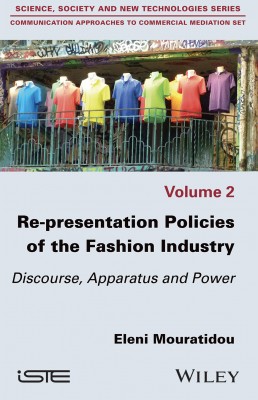
The commoditization of goods, environmental pollution, relocation, the exploitation of cheap labor and encouragement to overconsume – these traits characterize the luxury fashion industry, whose economic growth continues to rise.
This book examines the way in which the mediations of commercial luxury fashion allow this industry to present itself as something that is not exclusively commercial. These mediations are known as “re-presentation” policies: actions that aim to produce commonplace goods, but also to set up an apparatus that will allow luxury brands to rebrand themselves using the processes of rewriting, of reinvestment and of reformulation.
Re-presentation Policies of the Fashion Industry presents semiotic and communication analyses of many of the sector’s strategies (advertising, museum exhibits, commercial scenography) and demonstrates how these strategies reflect the socioeconomic model of luxury fashion.
Part 1. Re-presentations and Artifices
1. Re-presentation as a Form of Artistic and Cultural Legitimization.
2. Investing Symbolically in the Museum, Transforming the Store: Re-presentation as an Iterative Event.
Part 2. Re-presentations and Forms of Life: The Religious and the Political
3. Re-presentation as a Cult Form.
4. Re-presentation as a Rewriting of Politics.
Part 3. The Power of the Fashion Industry’s Re-presentational Apparatus
5. The Industrialization of Creativity.
6. Reinvesting, Diverting, Reformulating and Entertaining: The Leisure-form of the Fashion Industry.
Eleni Mouratidou is a Lecturer and Research Director at Paris 13 University and the LabSIC in France. Her research focuses on the processes of rewriting and of societal representation, with an emphasis on the framework of commercial mediations.